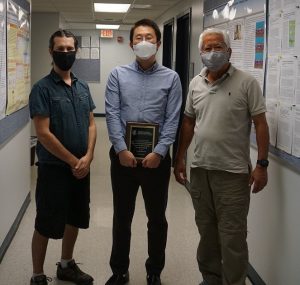Last month, I had lunch with a young South Korean who’d spent the past five years as a graduate student in Fort Lauderdale. We talked about recruiting the world’s top graduate students. His insights came from his autobiography.
Once Sang-Bin Lee decided he wanted to study termites, it was obvious to him that the place to do it was wherever Dr. Nan-Yao Su was. Lee was attracted by the opportunity to learn from one of the world’s leading authorities on subterranean termites and the inventor of the technology behind Sentricon®. Lee found some appeal as well in the prospect of autumn Saturdays among a roaring throng of football fans.
He acknowledged his disappointment upon learning that Dr. Su’s lab was 300 miles from Ben Hill Griffin Stadium. Once he got to the Fort Lauderdale Research and Education Center, it didn’t take him long to make his first discovery: It was the best place in the world to pursue his Ph.D. in entomology and nematology.

For five years, Lee has lived in what he calls the “grad house” at the center. It’s a three-minute walk to the lab where he’s become an expert himself in termite behavior. From there it’s an even shorter walk to knock on the doors of Su, Thomas Chouvenc, Rudolf Scheffrahn, and William Kern. Lee knocked a lot, and they almost always welcomed him in.
The grad house is also a fabulous deal compared to the rent in the city around him. He’s been able to cover it on a graduate student stipend and still have something left over for a few nice restaurant meals with his wife (who’s also a graduate student at FLREC).
Graduate students like Lee are the core of our research operation in that they put in most of the field and lab hours that lead to discovery. They’re the bridge that allow us to solve today’s challenges while simultaneously addressing tomorrow’s by preparing future academics, professionals and leaders.
Lee’s point about recruitment was that the advantages of our research and education centers are selling points to attract talent.
Fort Lauderdale’s include world-class and accessible research faculty, millions of termites under a single lab roof that means never having to go collect specimens, on-site living quarters and connections to local stakeholders that give meaning and purpose to the research.
Let’s use those advantages to our advantage. Research gets the headlines, but let’s not forget the “E” in REC. Lee’s story demonstrates how the unique characteristics of an REC can attract someone from the other side of the globe.
Last month Lee successfully defended his dissertation. I salute Lee and the other 494 College of Agricultural and Life Sciences students who receive their graduate and undergraduate degrees this month.
Dr. Lee hopes to one day add another title: Dad. While he pursues a career in academia solving today’s problems, he hopes to raise a child who’ll address tomorrow’s—as a Gator. Sounds like a pretty good graduate recruitment plan to me.
 0
0
